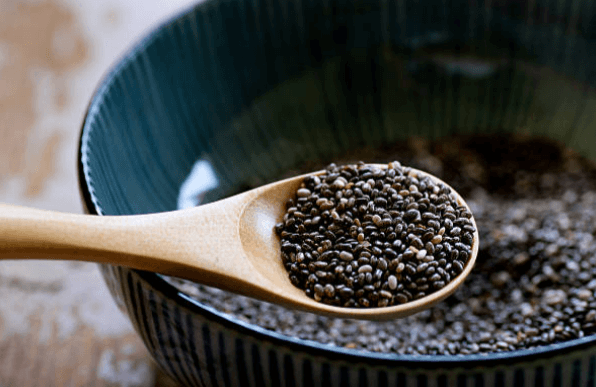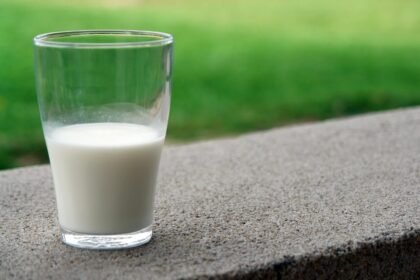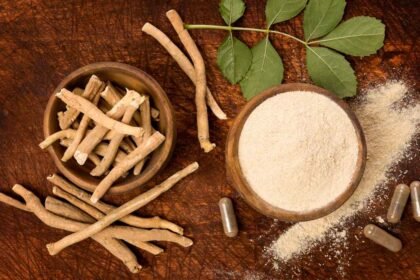The health advantages of chia seeds, which pack a nutritional punch despite their tiny size, have caused a stir in the wellness industry. These small seeds are a great source of fiber, protein, and healthy omega-3 fatty acids, making them a superfood.
Discover the top 10 unexpected health advantages of chia seeds, including improved heart health, aided weight loss, and much more, in this in-depth study. Read on to learn about the many ways in which chia seeds can help you, whether you’re already a health nut or just hoping to take better care of yourself.
Nutritional Value of Chia Seeds
Chia seeds are a superfood, meaning they pack a lot of nutrients into a small space. They are a great supplement to any diet because of the wealth of macro and micronutrients they contain. The nutritional benefits of chia seeds will be discussed, as well as how they stack up against other types of seeds.

Macronutrients and Micronutrients
Our bodies have a greater need for macronutrients, such protein, carbs, and fats, than they need for micronutrients, like vitamins and minerals, which are needed in much smaller quantities.
Macro and micronutrients can be found in healthy amounts in chia seeds. There are the following nutrients in just one ounce of chia seeds:
- Calories: 137
- Protein: 4 grams
- Fat: 9 grams (5 of which are omega-3 fatty acids)
- Carbohydrates: 12 grams (11 of which are fiber)
- Calcium: 18% of the RDI (Recommended Dietary Intake)
- Magnesium: 30% of the RDI
- Phosphorus: 27% of the RDI
- Zinc: 13% of the RDI
In addition to their anti-inflammatory benefits, chia seeds are loaded with antioxidants like quercetin and kaempferol. Due to their high fiber content, they are beneficial for weight loss as they help with digestion and make you feel full for longer.
Comparison With Other Seeds
It’s common to hear chia seeds mentioned in the same breath as other seeds like flax and hemp. Chia seeds have a higher fiber content than other seeds, yet every seed has its own distinct nutritional profile. Compared to flaxseeds (which have 8 grams per ounce) and hemp seeds (which have only 1.2 grams per ounce), chia seeds have a far greater fiber content (11 grams per ounce).
Chia seeds are richer in alpha-linolenic acid (ALA), an omega-3 fatty acid, than flaxseeds but lower in ALA than hemp seeds. In contrast to flaxseeds and hemp seeds, chia seeds are an even more potent source of antioxidants.
Health Benefits of Chia Seeds
1. Weight Management
A. High Fiber Content
There are 11 grams of fiber in every 28 grams of chia seeds, making them a fantastic fiber source. Fiber is essential for weight loss and maintenance because it makes you feel full longer, curbs your appetite, and stops you from eating too much. Fiber helps people feel fuller on fewer calories because it absorbs water and swells in the stomach after consumption.
In addition to assisting in blood sugar regulation, lowering insulin resistance, and curbing cravings for sweet or high-calorie foods, fiber slows the absorption of food in the digestive tract. Increasing one’s fiber intake has been linked in research to a slimmer physique.
B. High Protein Content
There are 4 grams of protein in every ounce (28 grams) of chia seeds. Weight reduction and maintenance rely heavily on protein because it aids in satiety, cuts cravings, and keeps muscle mass stable.
Calorie consumption is decreased because of the release of hormones that signal fullness and decrease hunger after eating protein. Protein also aids in the preservation of muscle mass, which is important while trying to lose or maintain a healthy amount of weight. The more muscle we have, the more energy we expend relative to our fat mass.
C. Low-Calorie Content
Only 137 calories may be found in an ounce (28 grams) of chia seeds, making them a low-fat food option. Calorie-dense foods can be counterproductive to weight loss and maintenance since they keep you feeling hungry even though you’re eating less calories overall.
In addition, chia seeds are a great complement to low-carb or ketogenic diets because they contain only 12 grams of carbohydrates per ounce (28 grams).
2. Heart Health
Heart-healthy elements can be found in abundance in chia seeds. They help maintain a healthy heart because they are high in antioxidants, contain enough of omega-3 fatty acids, and lower inflammation. The positive effects of chia seeds on cardiovascular health will be discussed in depth here.
A. Rich in Omega-3 Fatty Acids
When it comes to getting your omega-3s from plants, chia seeds are among your best bets. Omega-3 fatty acids are a type of vital fat that our bodies need but are unable to manufacture on their own. They help reduce blood pressure, lipids, the risk of blood clots, and heart disease, making them essential for heart health.
Chia seeds are a good source of omega-3 fatty acids, specifically alpha-linolenic acid (ALA), which the body then metabolizes into EPA and DHA. Consuming chia seeds has been found to raise plasma levels of the heart-healthy fats EPA and DHA.
B. High in Antioxidants
Antioxidants, which prevent cell damage from free radicals, are abundant in chia seeds. Unstable free radical molecules have been connected to oxidative stress, which in turn has been implicated in the onset of chronic diseases including cardiovascular disease.
Flavonoids, quercetin, and chlorogenic acid are just some of the antioxidants that can be found in chia seeds. Together, these antioxidants shield cells from harm and lower cardiovascular disease risk.
C. Reduces Inflammation
The anti-inflammatory qualities of chia seeds are another way in which they help heart health. Heart disease is just one of many chronic conditions that have been related to chronic inflammation. Chia seeds’ omega-3 fatty acids and antioxidants may help reduce inflammation, which is good for the heart.
Moreover, chia seeds are rich in fiber, which promotes good gut bacteria and can help lessen inflammation. Inflammation in the body is reduced when the gut microbiome is healthy, according to research.
3. Digestive Health
Chia seeds have been shown to improve digestive health, and this is just one of their many benefits. They aid in digestion and intestinal regularity due to their high fiber content. In this essay, I’ll explain how chia seeds help the digestive system in further depth.

A. High in Fiber
The dietary fiber content of chia seeds is high, with about 11 grams in every ounce. Regular bowel movements, the avoidance of constipation, and optimal digestive function are all aided by the inclusion of fiber-rich foods in one’s diet.
Maintaining a balanced gut microbiome depends on a diet rich in fiber, which helps to foster the development of good gut bacteria. Maintaining a balanced microbiota in the digestive tract is important for everyone’s health since it lowers the chance of developing metabolic syndrome, type 2 diabetes, and cardiovascular disease.
B. Helps to Regulate Bowel Movements
Chia seeds are rich in both soluble and insoluble fiber, making them a potent natural laxative. In the digestive tract, soluble fiber combines with water to produce a gel, which slows digestion and makes you feel full for longer.
On the other hand, insoluble fiber increases stool volume and encourages frequent bathroom breaks. This combination of dietary fibers is very effective in warding off digestive issues like constipation.
C. Reduces the Risk of Diverticulitis
Inflamed or infected pouches or pockets in the gut wall are what cause diverticulitis. Leaving this problem untreated might result in serious complications, including severe stomach discomfort, fever, and other symptoms.
Eating a diet high in fiber is one of the best things you can do to avoid getting diverticulitis. The high fiber content of chia seeds has been linked to a decreased chance of acquiring this disease.
4. Blood Sugar Control
Blood sugar regulation is only one of the many health advantages associated with consuming chia seeds. They contribute to better blood sugar control and a lower risk of developing type 2 diabetes because of their low glycemic index. Here, we’ll go deep into the research around chia seeds and their potential role in lowering blood sugar levels.
A. Low Glycemic Index
Chia seeds are low on the glycemic index, so they don’t raise blood sugar levels quickly after eating them. Those with diabetes or at risk for getting diabetes will benefit from this since it aids in maintaining steady blood sugar levels and avoiding dangerous lows and highs.
B. Reduces Insulin Resistance
The hormone insulin controls blood sugar levels, and insulin resistance occurs when the body stops responding to insulin. Type 2 diabetes is a potential outcome of this disorder, as are weight gain and cardiovascular disease.
The insulin resistance of people with type 2 diabetes can be lowered by consuming chia seeds. This is probably because of the high fiber content of these foods, which works to reduce the rate at which sugar is absorbed into the bloodstream and increase the effectiveness of insulin.
C Improves Glucose Tolerance
It has also been proven that taking chia seeds helps with glucose tolerance, or the body’s capacity to control blood sugar levels after eating carbs. Researchers found that people who ate chia seeds for 12 weeks had better glucose tolerance than those who didn’t.
5. Bone Health
Because of their high nutrient content and myriad health advantages, chia seeds have been labeled a “superfood.” The capacity of chia seeds to improve bone health is only one of their many advantages.
Minerals like calcium, phosphorus, and magnesium, all of which contribute to strong skeletons, can be found in abundance in these foods. Here, we’ll go deep into the ways in which chia seeds can improve your bones’ health.
A. Rich in Calcium
Calcium is a mineral that helps keep bones strong and healthy. About 177 milligrams of calcium may be found in just one ounce of chia seeds, making them a superb calcium source. Because of this, they are a great alternative for people who cannot digest the calcium found in dairy products.
B. High in Phosphorus
Phosphorus, together with calcium, plays a crucial role in the development of healthy bones and teeth. Phosphorus is another nutrient that is abundant in chia seeds; one ounce of chia seeds has about 265 mg of phosphorus.
C. High in Magnesium
Bones need the element magnesium, which also controls the body’s calcium levels. The magnesium content of chia seeds is high, with about 44.8 mg per ounce.
Zinc, vitamin K, and vitamin D are just a few of the essential minerals found in chia seeds that are beneficial to bone health.
6. Skin Health
Because of its high nutritional value and impressive list of health advantages, chia seeds have become a trendy “superfood” in recent years. Their capacity to boost skin health is just one of many advantages. Antioxidants and essential fatty acids found in abundance in chia seeds can support skin health and improve its appearance. The positive effects of chia seeds on skin will be discussed in depth here.
A. High in Antioxidants
Antioxidants are compounds that shield the body from free radicals, which can cause accelerated aging and other health issues if left unchecked. The antioxidant concentration of chia seeds is even higher than that of blueberries, making them a fantastic food choice.
B. Rich in Essential Fatty Acids
The necessary fatty acids omega-3 and omega-6 can be found in abundance in chia seeds. Fatty acids like this are essential for skin health since they keep it supple and wrinkle-free.
C. Improves Skin Moisture
Additionally, chia seeds help skin retain hydrated. Mucilage, a type of gel, is present, and it may absorb up to 12 times its weight in water. Chia seeds have been shown to reduce dryness and irritation of the skin after consumption, improving the skin’s overall appearance.
7. Brain Function
As more and more people learn about the incredible nutritional value of chia seeds, their popularity has skyrocketed. Chia seeds are useful because they improve cognitive performance. Omega-3 fatty acids, B vitamins, and other elements found in chia seeds are beneficial to brain function. The positive effects of chia seeds on cognition will be discussed in depth here.
A. Rich in Omega-3 Fatty Acids
Alpha-linolenic acid (ALA) is one of the omega-3 fatty acids found in abundance in chia seeds. Improved cognitive function and protection against age-related cognitive decline are only two of the many benefits of these fatty acids for brain health.
B. High in B Vitamins
Thiamin, riboflavin, niacin, and folate are just some of the B vitamins found in abundance in chia seeds. These vitamins are essential for proper brain function because they aid in the maintenance of nerves and in the control of neurotransmitter production.
C. Reduces Anxiety and Depression
The anti-anxiety and mood-boosting properties of chia seeds are an added bonus. They include the amino acid tryptophan, a precursor to the mood-regulating neurotransmitter serotonin. Chia seeds and other foods high in tryptophan have been demonstrated to alleviate stress and sadness, according to research.
8. Energy Boost
As more and more people learn about the incredible nutritional value of chia seeds, their popularity has skyrocketed. Chia seeds can give you a little extra pep in your step, which is just one of their many advantages.
Chia seeds can be a good source of long-lasting energy because they are rich in protein, fiber, and omega-3 fatty acids. In this essay, I’ll explain how chia seeds can boost stamina and performance.
A. High in Protein
Protein-rich chia seeds provide the body with all nine of the amino acids it needs to function normally. Protein is critical for maintaining energy levels since it aids in blood sugar control and prevents energy lows.
B. High in Fiber
Energy levels can be maintained with the help of the fiber included in chia seeds. The digestion of carbohydrates is slowed by fiber, which helps minimize the highs and lows in blood sugar that can cause weariness.
C. Rich in Essential Fatty Acids
The necessary fatty acids omega-3 and omega-6 can be found in abundance in chia seeds. These fatty acids are critical for keeping up stamina because they aid in the structure of cell membranes, which are in charge of the efficient transfer of nutrients into cells.
9. Cancer Prevention
As more and more people learn about the incredible nutritional value of chia seeds, their popularity has skyrocketed. Chia seeds may be useful in warding against cancer, which is one of their many advantages. Antioxidants, fiber, and phytochemicals included in chia seeds have shown promise in cancer prevention. In this post, we’ll go further into the role chia seeds play in warding off cancer.
A. Rich in Antioxidants
Antioxidants are abundant in chia seeds and may protect cells from oxidative stress. Antioxidants can help neutralize free radicals, which can contribute to oxidative damage and ultimately the development of cancer.
B. High in Fiber
The high fiber content of chia seeds has been linked to a reduced risk of colon cancer through limiting exposure to carcinogens in the digestive tract.
C. Contains Phytochemicals
Phytochemicals, which are found in chia seeds, are known to have anti-cancer effects. Studies have revealed that phytochemicals like quercetin and kaempferol can stop cancer cells from multiplying.
10. Dental Health
As more and more people learn about the incredible nutritional value of chia seeds, their popularity has skyrocketed. The potential for chia seeds to improve oral health is one of their many advantages.
Healthy teeth and gums depend on a diet rich in calcium, phosphorus, and other elements found in abundance in chia seeds. The positive effects of chia seeds on teeth will be discussed in depth here.
A. High in Calcium
Calcium, a mineral necessary for healthy teeth and bones, may be found in high concentrations in chia seeds. Calcium fortifies enamel, making it more resistant to acid erosion and degradation.
B. High in Phosphorus
Phosphorus, another mineral necessary for strong teeth and bones, may be found in abundance in chia seeds. Together with calcium, phosphorus helps fortify tooth enamel and improve dental health.
C. Helps to Prevent Tooth Decay
The antibacterial qualities of chia seeds can help to reduce the number of cavity- and gum disease-causing germs in the mouth. High quantities of soluble fiber in chia seeds may also encourage saliva production and flush away food debris and bacteria in the mouth.
How to Incorporate Chia Seeds into Your Diet
Chia seeds are a highly adaptable superfood that may be used in many different recipes. The recommended daily allowance and methods of consuming chia seeds are as follows:
Different Ways to Consume Chia Seeds
- Add chia seeds to your morning smoothie or juice
- Sprinkle chia seeds on top of your yogurt or oatmeal
- Use chia seeds as a replacement for eggs in baking recipes
- Mix chia seeds with water or almond milk to make a healthy pudding
- Add chia seeds to your salad dressing for a healthy boost
- Mix chia seeds with your favorite nut butter for a tasty spread
Recommended Daily Intake
Individuals with different ages, sexes, and health conditions have different chia seed RDAs. However, 1-2 teaspoons of chia seeds each day is a good rule of thumb. Consuming too many chia seeds can cause gastrointestinal discomfort like gas, bloating, and diarrhea. Chia seeds absorb water and swell up in the digestive tract, therefore it’s crucial to drink lots of water along with them.












